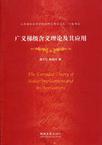广义梯级含义理论及其应用
2009-5
河北大学出版社
龚卫东,韩晓玲 著
254
在言语交际过程中,说话人提供的弱信息命题通常被认为是对强信息命题的否定,作为会话含义的一个范畴的梯级含义就此产生。梯级含义在语言学、语用学范畴内已有较为详尽的论述,突出表现在以下两个方面:新格赖斯语用学和后格赖斯语用学。前者认为梯级含义是一种自动优先生成的常规含义;后者则认为梯级含义属于特殊会话含义,产生于特定的语言环境,并非某些固定不变的词语。 毋庸置疑,以往的梯级含义研究囿于量词等级含义,这其实仅是广义梯级含义的一个特例。因其没有囊括更广泛意义上的梯级含义而不具有普遍性。相反,我们赖以生存的世界是由按照不同梯级排列的多种物质构成的,所以,梯级和梯级含义的研究领域必须拓展。 本书旨在传统量词梯级理论的基础之上构建一个广义梯级含义理论,并从语言运用的三个层面探讨其对梯级现象的创新阐释。
意义研究始终是语言学,心理学和哲学等学科关注的焦点问题之一。话语含义是意义研究中的一个重要课题。因此,《广义梯级含义理论及其应用》选择话浯含义中的梯级含义作为研究对象,以原有酌转统量词梯级婵沦为基础,构建一个研究范围和研究内容都得以拓展和丰富的广义梯级含义理论,并从认知语用学的视角探讨其对梯级现象的创新闸释。在此基础上,《广义梯级含义理论及其应用》指出,言语交际中的梯级推理必须受制工人类人脑的认知机制和社会语用适切性条件,从而才能有效避免梯级研究中因忽略语境因素导致含义泛化的问题。
龚卫东,山东人,1972年生。1996年毕业于曲阜师范大学外语系并获学士学位,1999年获外国语言学及应用语言学硕士学位,2006年获上海外国语大学英语语言文学博士学位。现为烟台大学外国语学院副教授,硕士生导师;河北大学兼职硕士生导师。主要学术兴趣为认知语用学、语言哲学、话语分析等。在国内重要学术刊物上发表相关论文10余篇。 韩晓玲,山东人,1955年生。1982年毕业于山东师范大学外语系并获学士学位,1995年获美国卡什·纽曼大学教育硕士学位,现为烟台大学外国语学院教授,硕士生导师。主要学术兴趣为跨文化交际、美国现代文学等。在国内外重要学术刊物上发表论文10余篇。出版专著(译著等)5部。获奖成果7项,其中省部级2项。目前承担项目共5项,其中省部级1项。
Abstract Chapter One Introduction 1.1 Preliminary Remarks 1.2 A Broad Preview of Scalar Implicatures 1.3 Rationale of the Present Research 1.4 Objectives of the Current Research 1.5 Significance of the Current Research 1.6 Layout of the Book Chapter Two Literature Review 2. 1 Introduction 2.2 The Gricean Framework of Meaning Classification 2.3 Grice's Theory of Implicatures: The Cooperative Principle 2.4 Two Mainstream Approaches to Scalar Implicature 2.4.1 The Neo-Gricean Approach 2.4.2 The Post-Gricean Approach 2.5 Interim Summary 2.6 Scalar Implicatures in Experimental Pragmatics 2.7 Problems with the Previous Accounts 2.8 Summary Chapter Three Theoretical Framework 3.1 Introduction 3.2 Empirical Observation 3.3 Cognitive Orientation 3.3.1 Conceptual Scales 3.3.2 Pragmatic Scales as Conceptual Scales 3.3.3 Scalar Models 3.3.4 Two Properties of Scalar Models 3.3.5 Four Major Kinds of Scalar Logic 3.4 Pragmatic Constraints on Scalar Implicatures 3.5 Summary Chapter Four Scalar Implicatures via Polarity Items 4.1 Introduction 4.2 Polarity Sensitivity of Polarity Items 4.2.1 Polarity Items 4.2.2 Polarity Context 4.3 The Semantic Approaches to Polarity Items 4.3.1 Affectivity as Downward Entailment: Ladusaw (1979) 4.3.2 Affectivity as Negation. Baker (1970) and Linebarger (1980) 4.4 Scalar Model of Polarity Items (SMP) 4.4.1 The Journey Through the Study of Scalar Model 4.4.2 The Initial SMP 4.4.3 Comments on the Initial SMP 4.4.4 The Revised SMP 4.4.5 Comparison Between the Initial SMP and the Revised SMP 102 4.4.6 Cognitive Understanding of the Revised SMP 4.4.7 Comments on the Revised SMP 4.5 Supplements to the Revised SMP 4.5.1 The Pragmatic Constraints on the Revised SMP 4.5.2 Solutions to the Three Untouched Issues 4.6 Summary Chanter Five Scalar ImDlicatures via Evenas a Scalar Operator 5.1 Introduction 5.2 A General Survey of Previous Studies on Even 5.2.1 The Argumentative Approach to Even 5.2.2 The Semantic Approaches to Even 5.2.3 The Pragmatic Approaches to Even 5.2.4 The Scalar Approaches to Even 5.3 A Dynamic Cognitive-pragmatic Approach to Even 5.3.1 Relevance-oriented Procedural Meaning of Even 5.3.2 Ad hoc Pragmatic Scales and the Dynamic Scalar Interpretation of Even-sentences 5.4 Summary Chapter Six Scalar Implicatures vis Hyperbolic Metaphors Chapter Seven Conclusion References
